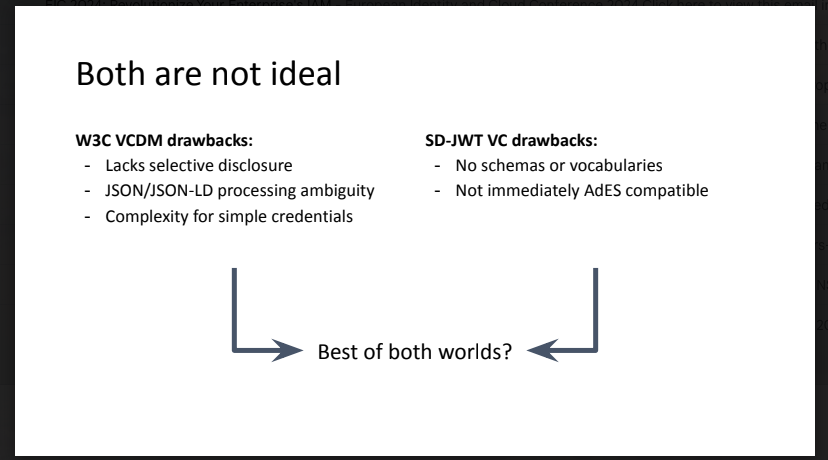- From: Kaliya Identity Woman <kaliya@identitywoman.net>
- Date: Tue, 19 Mar 2024 18:18:55 -0700
- To: Kim Hamilton <kimdhamilton@gmail.com>
- Cc: Orie Steele <orie@transmute.industries>, "W3C Credentials CG (Public List)" <public-credentials@w3.org>
- Message-ID: <CANez3f7ZbACmpyNR8hkUzwsOvS83muyf3vFMLiKC4NqvFf5Xpg@mail.gmail.com>
Lucy and I have written two reports explaining this landscape of formats and signatures. Here is the first one and infographic during the pandemic: https://www.lfph.io/wp-content/uploads/2021/02/Verifiable-Credentials-Flavors-Explained.pdf https://www.lfph.io/wp-content/uploads/2021/04/Verifiable-Credentials-Flavors-Explained-Infographic.pdf This was written last year https://medium.com/@identitywoman-in-business/new-paper-and-infographic-on-flavors-of-digital-credentials-released-b9b6ec5b95af https://drive.google.com/file/d/1mZVcGlcxAqQaOr-pBUt6-Amh2NocuaNp/view - Kaliya On Tue, Mar 19, 2024 at 5:42 PM Kim Hamilton <kimdhamilton@gmail.com> wrote: > Right, in the base media type. But SD-JWT describes a mechanism for > performing SD on JSON. It would be good to have a more transparent > mechanism to allow anchoring statements in something reference-able. It > seems a bit muddy now. Perhaps DIF, CCG, OIDF, and more can collaborate on > some rubric here. > > On Tue, Mar 19, 2024 at 5:35 PM Orie Steele <orie@transmute.industries> > wrote: > >> The VCDM is JSON-LD, and both JSON and RDF do not support selective >> disclosure in their base media types. >> >> SD-JWT only supports selective disclosure on JSON. >> >> ECDSA-SD only supports selective disclosure in JSON-LD (I think). >> >> MDoc only supports selective disclosure of in CBOR. >> >> There are basically 2 ways to secure media types... You can secure them >> in a media type agnostic manner, like JWS or COSE Sign1. Or you can secure >> them in a media type aware manner, like JWT, SD-JWT, mDoc, SD-CWT etc. >> >> The W3C VCDM is a media type that is built on +ld+json meaning it's >> always JSON-LD that you are securing... Regardless of how you secure it. >> >> OS >> >> On Wed, Mar 20, 2024, 10:27 AM Kim Hamilton <kimdhamilton@gmail.com> >> wrote: >> >>> Thanks for stating it clearly. This is why the statement "VCDM lacks >>> selective disclosure" trips the brain wires. It belongs at the >>> signature/proof level. And of course, selective disclosure can be performed >>> in different ways. Just wondering if I missed the boat on any >>> considerations that make the credential data model itself more or less >>> conducive to selective disclosure, which that statement appears to say. >>> >>> Or maybe it refers to a specific brand of selective disclosure, and not >>> selective disclosure in the general sense. >>> >>> Does SD-JWT-VC imply a landscape in which there will be a different VC >>> format for each signature suite? This is very different from my mental >>> model of VC data model, with the possibility of using different signature >>> suites. I'd be eager to learn more about the advantages of that. >>> >>> On Tue, Mar 19, 2024 at 5:10 PM Orie Steele <orie@transmute.industries> >>> wrote: >>> >>>> Selective disclosure is a property of the securing format, not the data >>>> model. >>>> >>>> Sd-jwt and ecdsa-sd both support selective disclosure, but with very >>>> different performance and security trade offs. >>>> >>>> It's not correct to say that CBOR, YAML, JSON, XML or JSON-LD support >>>> selective disclosure. >>>> >>>> It is correct to say SD-JWT, SD-CWT, mDoc, goridan envelopes or >>>> ecdsa-sd support selective disclosure. >>>> >>>> It seems jades as a requirement precludes the use of CBOR or Data >>>> Integrity Proofs, or even JWT, given JWTs are always compact (no JSON >>>> Serialization). >>>> >>>> OS >>>> >>>> On Wed, Mar 20, 2024, 9:53 AM Kim Hamilton <kimdhamilton@gmail.com> >>>> wrote: >>>> >>>>> Hi all, >>>>> I'm trying to get my head around the variety of VC formats. I ran >>>>> across this deck and I'm curious why it would say VCDM lacks selective >>>>> disclosure (included screenshot and deck). It does via signature suites, so >>>>> in a sense the statement "does not compute". >>>>> >>>>> Eager to learn about the new VC formats, similarities and differences. >>>>> >>>>> Thanks, >>>>> Kim >>>>> [image: Screenshot 2024-03-19 at 4.36.16 PM.png] >>>>> >>>>
Attachments
- image/png attachment: Screenshot_2024-03-19_at_4.36.16___PM.png

Received on Wednesday, 20 March 2024 01:19:37 UTC